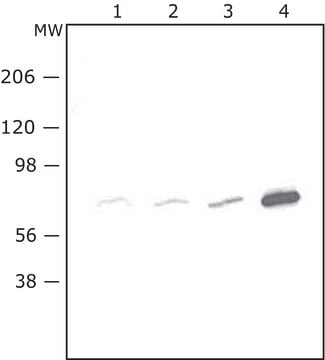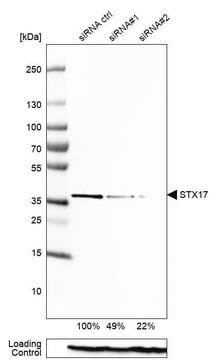LYSISO1
Lysosome Isolation Kit
sufficient for 25 g (tissue), sufficient for 20 mL (packed cells), enrichment of lysosomes from tissues and packed cells
About This Item
Recommended Products
Quality Level
usage
sufficient for 20 mL (packed cells)
sufficient for 25 g (tissue)
technique(s)
centrifugation: suitable
fractionation: suitable
storage temp.
2-8°C
General description
Application
- in the isolation of cytosol and lysosome
- to obtain enriched light and heavy lysosomal fractions from cultured cells
- in the isolation of lysosomes of mouse bone marrow macrophages (BMMs)
- in lysosome purification
The Lysosome Isolation Kit provides a method for isolating lysosomes from animal tissues and from cultured cells by differential centrifugation followed by density gradient centrifugation and/or calcium precipitation. The presence of lysosomes can be measured by assaying the activity of the lysosomal marker Acid Phosphatase, with the Acid Phosphatase Assay Kit (Cat. No. CS0740). Separation from other organelles can be measured using the appropriate marker detection kits available from Sigma.
Features and Benefits
- Generates functional organelles for metabolism and disease research
- Includes protease inhibitor to manage degradation
- Measures integrity with included Neutral Red dye
- Choose from multiple options to obtain enriched fractions
- Enriched fractions for intact and functional lysosomes from tissues and cells
- Suitable for functional studies including protein degradation
Kit Components Also Available Separately
- P8340Protease Inhibitor Cocktail, for use with mammalian cell and tissue extracts, DMSO solution 5 mLSDS
Signal Word
Warning
Hazard Statements
Precautionary Statements
Hazard Classifications
Eye Irrit. 2 - Skin Irrit. 2
Storage Class Code
10 - Combustible liquids
Flash Point(F)
188.6 °F
Flash Point(C)
87 °C
Choose from one of the most recent versions:
Certificates of Analysis (COA)
Don't see the Right Version?
If you require a particular version, you can look up a specific certificate by the Lot or Batch number.
Already Own This Product?
Find documentation for the products that you have recently purchased in the Document Library.
Customers Also Viewed
Articles
Centrifugation separates organelles based on size, shape, and density, facilitating subcellular fractionation across various samples.
Centrifugation separates organelles based on size, shape, and density, facilitating subcellular fractionation across various samples.
Centrifugation separates organelles based on size, shape, and density, facilitating subcellular fractionation across various samples.
Centrifugation separates organelles based on size, shape, and density, facilitating subcellular fractionation across various samples.
Our team of scientists has experience in all areas of research including Life Science, Material Science, Chemical Synthesis, Chromatography, Analytical and many others.
Contact Technical Service













